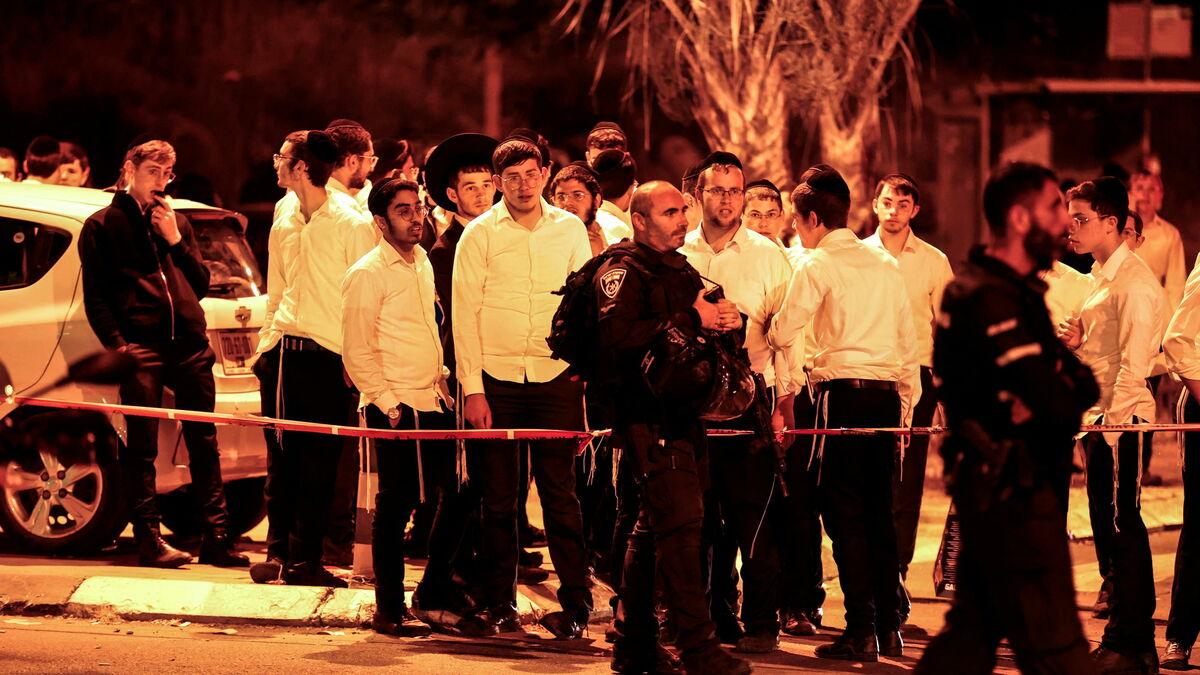Israeli police led a manhunt early Friday after a fatal attack on three people in the suburbs of Tel Aviv and perpetrated on the anniversary of the creation of the Jewish state. Police called on the public to provide information on the whereabouts of the assailants, releasing the photos and names of two Palestinians suspected of carrying out the attack, which also injured four people, three of them seriously, according to the Magen David Adom (MDA), the Israeli equivalent of the Red Cross.
The two men, Assad Youssef Al-Rafai, 19, and Tzabhi Amad Abu Shakir, 20, are from the village of Rumana in the Jenin sector in the northern occupied West Bank, according to a police statement. ‘The scene of the attack was complex,’ says Israeli rescuer Alon Rizkan of the MDA, who says he saw a 40-year-old man dead near a roundabout, then another man unconscious in an adjacent park , who was eventually pronounced dead, and another by his side who succumbed to his injuries.
This sixth anti-Israeli attack since March 22 occurred in Elad (center), a city of around 50,000 inhabitants, including many ultra-Orthodox Jews, near Tel Aviv. The three victims of the attack are Yonatan Habakuk, 44, and Boaz Gol, 49, both residents of Elad, and Oren Ben Yiftah, 35, a resident of Lod (center), according to Israeli media.
Gaza and the West Bank sealed off
The Palestinian armed Islamist movements Hamas and Islamic Jihad “celebrated” a “heroic” attack, calling it a “reaction” to recent tensions in Jerusalem, but did not claim it. For his part, Palestinian President Mahmoud Abbas condemned « the murder of Israeli civilians », deploring that « the murders of Palestinians and Israeli civilians lead to a deterioration of the situation », according to the Palestinian agency Wafa. Defense Minister Benny Gantz announced a closure, until Sunday, of the Gaza Strip and the occupied West Bank in order to « prevent the flight of terrorists » to this Palestinian territory.
The Elad attack brings to 18 the number of people killed in anti-Israeli attacks since March 22, some carried out by Israeli Arabs and others by Palestinians. In the wake of the first attacks, Israeli forces carried out a series of operations in the occupied West Bank. In total, at least 26 Palestinians, including assailants, have been killed since the start of this wave of anti-Israeli attacks.
US Foreign Minister Antony Blinken « vehemently » condemned the attack, according to a statement from the State Department. « It was a horrific attack, targeting innocent men and women, particularly heinous as Israel celebrated its Independence Day, » the secretary of state said, assuring that the United States stood » firmly » alongside their Israeli allies.
For his part, Emmanuel Macron denounced on Twitter « a despicable terrorist attack ».
Tensions in Jerusalem
“This operation (in Elad) testifies to the anger of our people at the attacks of the occupation against the holy places. The storming of the Al-Aqsa mosque cannot go unpunished,” said Hazem Qassem, spokesman for Hamas, the Islamist movement which controls the Gaza Strip, a Palestinian enclave of 2.3 million inhabitants. « The desecration by occupation forces (the name given to the Israeli police and army by Palestinians) and settler gangs in Al-Aqsa has crossed all red lines, » added Muhammad Hamid Abu Al-Hassan. , from the political office of the Islamic Jihad.
At the same time, clashes between Israeli police and Palestinians left nearly 300 injured on the esplanade of the Mosques, in the Palestinian part of Jerusalem, occupied since 1967 by Israel. After a break of several days linked to the end of the Muslim fasting month of Ramadan, Jewish worshipers went to the esplanade on Thursday, the day of the 74th anniversary, according to the Hebrew calendar, of the creation of the State of Israel. which coincided with the end of the Muslim celebrations of Eid al-Fitr.
Under an unspoken status quo, non-Muslims can visit the esplanade — Islam’s third holiest site and Judaism’s holiest spot under its name of « Temple Mount » — but without praying there. . However, a growing number of Jews are going there, and the fact that some of them pray surreptitiously there raises fears that this status quo will be challenged among many Muslims. Over the past few weeks, the Israeli government has repeatedly expressed its unwillingness to change the status quo. Israel, which controls access to the site, maintained its reopening to Jews on Thursday despite calls from Palestinian officials and countries in the region who feared new clashes.
